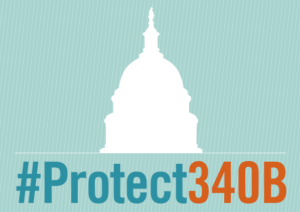New Law Protects 340B Hospitals from Eligibility Loss During COVID-19
by Admin | March 31, 2022 3:49 pm

March 31, 2022– Safety-net hospitals have been on the front lines of our national response to the COVID-19 public health emergency since it started in 2020. They have had to absorb massive changes in their day-to-day operations to serve waves of COVID patients. They scrambled to increase hospital bed and intensive care unit capacity, cared for COVID patients while taking extensive measures to avoid exposing other patients to the virus, and helped mobilize the most comprehensive vaccination campaign in the history of the nation. Many hospitals had to suspend non-emergency care for extended periods of time.
For some hospitals, these changes resulted in big changes to their patient case mix and a lowering of their Medicare disproportionate share (DSH) adjustment percentage. That percentage is a key measure that determines eligibility for 340B drug pricing program discounts for many hospitals. Dozens of these hospitals lost 340B eligibility during the COVID-19 emergency, and others are on the cusp of losing eligibility because of the pandemic when they file their next cost report.
340B Champions Deliver
Earlier this month, Congress passed legislation protecting these hospitals against the loss of 340B eligibility, and President Biden signed the bill into law. Under this law, hospitals that already lost 340B eligibility can apply now to be reinstated, while hospitals that would lose eligibility when they file their next Medicare cost report can apply for protection at that time. Hospitals in the first group have until April 14 to submit the necessary information and paperwork for reinstatement. Hospitals that expect to lose 340B eligibility will need to submit information showing how COVID affected their DSH percentage within 30 days of failing to meet the minimum.
The bipartisan legislation was a key priority for hospitals. Most types of hospitals qualify for 340B by reaching or exceeding a DSH percentage specified in the 340B statute, which represents the portion of patients they served who are Medicaid enrollees not entitled to Medicare inpatient hospital coverage or Medicare enrollees with low incomes. Only small, rural critical access hospitals (CAHs) do not need to meet a DSH percentage requirement to qualify. To remain eligible, hospitals undergo annual recertification. If a facility’s DSH percentage in its most recent Medicare cost report fell below the statutory level, the hospital can lose eligibility for a year or more. That would significantly increase its drug costs and reduce resources available to provide needed care in its community.
As affected hospitals raised concerns on Capitol Hill, 340B champions on both sides of the political aisle responded with legislation. Sen. John Thune (R-S.D.) and Rep. Doris Matsui (D-Calif.) introduced legislation to protect 340B eligibility that gained dozens of co-sponsors from both parties in each chamber. 340B hospitals and their advocates worked diligently to raise awareness of the problem and garner support for a solution.
That solution came in the form of the omnibus spending bill. Congressional leaders adopted language from those bipartisan bills into a legislative package that provided funding for the government for the rest of fiscal year 2022, including significant assistance to Ukraine.
“340B Health worked closely with congressional leaders on both sides of the aisle to protect 340B eligibility for hospitals serving on the front lines of the national COVID-19 response,” 340B Health President and CEO Maureen Testoni said. “We applaud Congress for making these important protections a priority in this legislative package. Safety-net hospitals that underwent large shifts in their patient populations during the pandemic should not lose access to crucial 340B resources because of their commitment to treating all patients in need. We look forward to working with HHS to ensure that all eligible hospitals receive these important protections.”
Next Steps for Affected Hospitals
The Health Resources & Services Administration (HRSA), the agency that oversees 340B, recently posted[1] guidelines and a template for an attestation form that affected hospitals will need to submit. Hospitals must document how COVID impacted their operations in a way that led to a lower DSH percentage along with other information the government will need in considering whether to reinstate eligibility.
The public health emergency is not yet over, and safety-net hospitals and their patients face challenges ahead in emerging from the COVID-19 pandemic. But because of the advocacy efforts of these providers and the lawmakers in Washington who support them, more hospitals will have the resources the 340B program delivers for the benefit of patients most in need.
- posted: https://www.hrsa.gov/opa/index.html
Source URL: https://340binformed.org/2022/03/new-law-protects-340b-hospitals-from-eligibility-loss-during-covid-19/